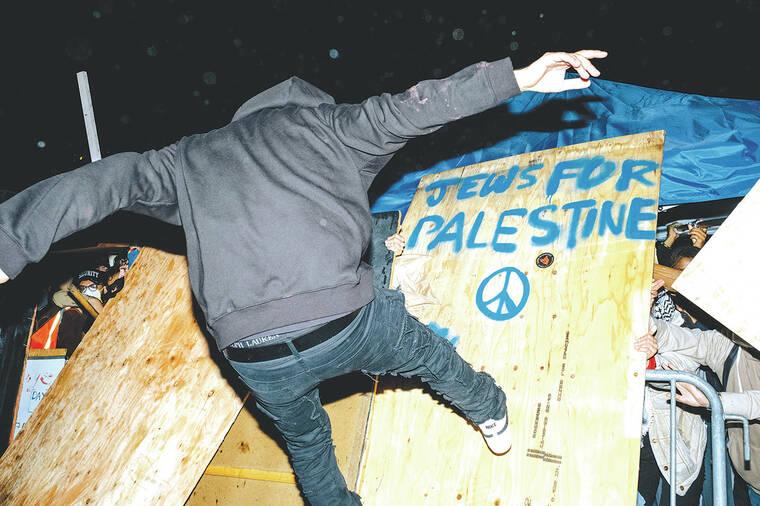Before the violence, UCLA thought a tolerant approach would work
LOS ANGELES — It was an example of a tolerant campus, where a burgeoning pro-Palestinian encampment might be left alone even as student protesters were arrested across the nation. Free speech would be supported as long as things remained peaceful, officials said last week.
But by Wednesday morning, the peace at the University of California, Los Angeles, had been shattered. The university canceled classes for the day, pushed back midterms and scrambled to address an overnight eruption of bloody violence spurred by dozens of counterprotesters.
The melee, which continued for hours without intervention, was a display of fierce hostility as fistfights broke out, chemicals were sprayed into the air and people were kicked or beaten with poles. Many participants did not appear to be students.
“They had bear spray, they had mace, they were throwing wood-like spears, throwing water bottles,” said Marie Salem, 28, a graduate student and pro-Palestinian protester who was part of the encampment. “They set off fireworks toward our camp directly. And so, we were all hands on deck, just guarding our barricades.”
Now, there is widespread frustration over UCLA’s handling of the incident, and the university faces scrutiny for its delayed response to the drawn-out chaos. Many critics were incredulous that even after officers with the Los Angeles Police Department arrived, there were no arrests or suspensions.
On Wednesday evening, campus officials ordered protesters to leave the encampment or face arrest. A stream of students departed, but hundreds remained around 7 p.m. and donned helmets, masks and goggles. Dozens of police officers were stationed around the protest site.
The school abides by a University of California policy that avoids involving law enforcement unless “absolutely necessary to protect the physical safety of our campus community.” But the coming days will test UCLA as it navigates its ideals, the presence of city police newly embedded on its campus, and heightened tension.
“There’s a sense that the other side has immunity,” Salem said as a police helicopter hovered above. Around her, the landscape was littered with trash, splintered wood, trampled clothing. A large Palestinian flag fluttered in the air. Students and faculty members had been urged to stay away from the area.
Friction at the university, where Jewish activists have had a larger presence than at other demonstrations, had been simmering since Sunday when a pro-Israel rally planted itself about 20 feet from the encampment.
A day later, tension mounted after reports that a Jewish student had been blocked by the pro-Palestinian group as he tried to get to the nearby library. Campus police had to intervene when about 60 pro-Israel demonstrators tried to enter the encampment and a fight broke out.
By 4 p.m. Tuesday, the administration’s approach abruptly shifted. Gene Block, the UCLA chancellor, declared the encampment an unlawful assembly and shut down the library and Royce Hall, the two main buildings near it.
“UCLA supports peaceful protest, but not activism that harms our ability to carry out our academic mission and makes people in our community feel bullied, threatened and afraid,” Block said in a statement. “These incidents have put many on our campus, especially our Jewish students, in a state of anxiety and fear.”
An alert informed students and employees that they could face serious sanctions, including discipline and potential dismissal for students, if they stayed.
At about 11 p.m., pro-Israel counterprotesters began trying to tear down an encampment barricade erected of metal gates, plywood and beach umbrellas, according to city officials. Shortly thereafter, they set off fireworks directly above the encampment. Videos on social media showed the firecrackers exploding near demonstrators and people spraying what appeared to be chemical irritants at one another.
Campus police were on the scene at that point and more arrived, along with university paramedics. But UCLA seemed to wait too long to call in the Los Angeles police, whose officers did not arrive until after midnight.
© 2024 The New York Times Company



